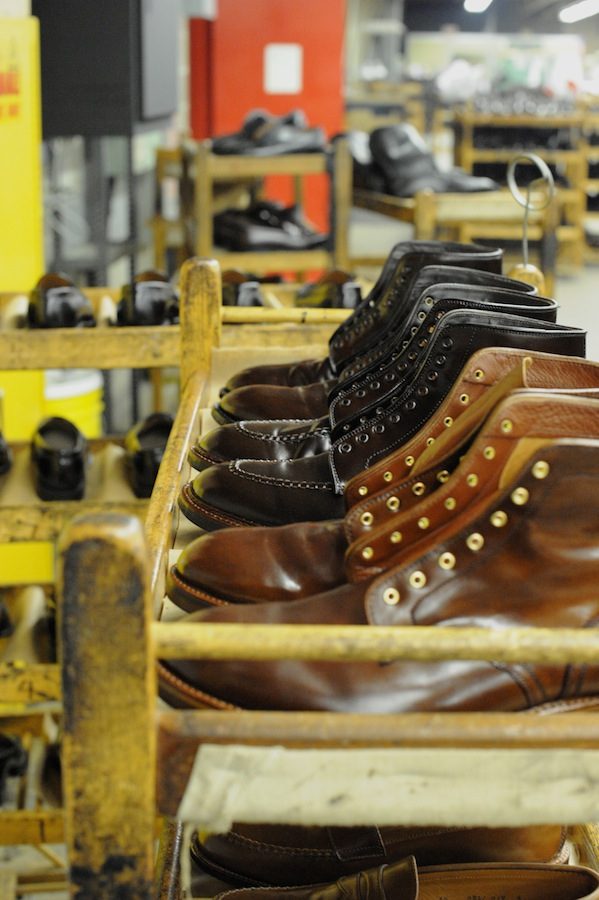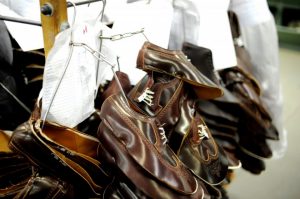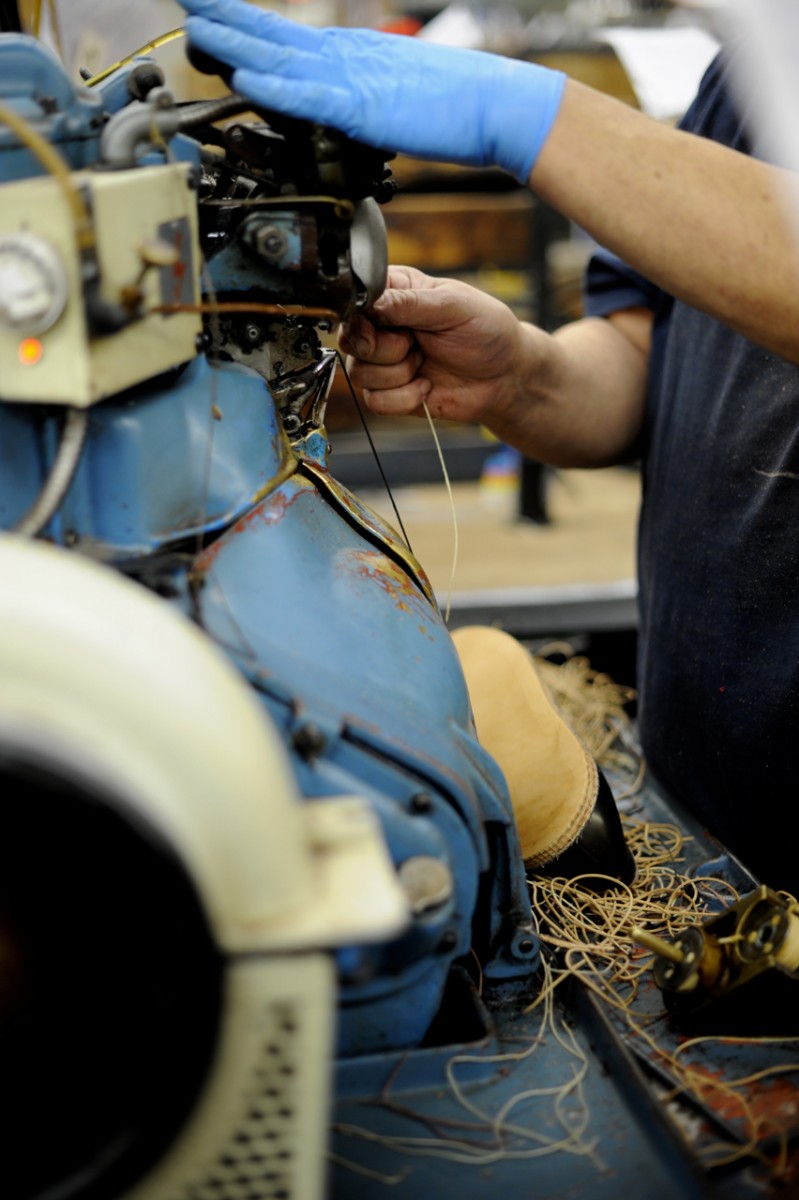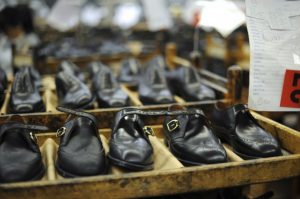There was once a time when buying shoes meant that an expert craftsman handmade and repaired each pair on a first name basis. In today’s global economy we often look for traits in shoes such as “Italian leather” and “handmade,” often ignoring the harm hidden in the process of mass production. With the ease of online shopping and guaranteed returns, trying to imagine just how important the shoe industry was in the early years of the United States is challenging. At Alden of New England, things have been ‘business as usual’ for nearly 170 years.
Original New England shoemaking was a trade based upon one craftsman making a single pair of shoes in a day, in a one-room cottage (ten footers). More often than not, it was a particular type of shoe viz., shoes for standing, made for some aristocrat. In the 1850s a series of inventions and innovations led to mechanized stitching and established operations creating a growing need for sturdy, durable footwear. The birth of the New England shoe industry followed quickly. Production over the traditional shoemaker was on the order of nearly 500 to 700 percent of what they had been previously, yet the new methods led to an extraordinary improvement in both quality and consistency, leading shoemakers to expand their breadth of style. With this innovation, companies grew while demand soared, and product made its way in every direction on the recently expanded railroad.
Consumers can now access a wealth of information and are beginning to trust their own decisions and personal taste rather than copying trends portrayed in advertising.
Today’s fashion consumption no longer calls for a handful of tastefully crafted, handmade pieces that last a lifetime. Trends come and go so quickly that there is no realistic time frame in making high-quality, handmade items that can follow current trends. Here, we can thank the Internet.
 In The Photo: Boxes of Alden Shoes Photo Credit: Horween Leather Company
In The Photo: Boxes of Alden Shoes Photo Credit: Horween Leather Company
In a recent interview with EcoSalon, featured on Business for Social Responsibility, Elizabeth Kline, author of Overdressed: The Shockingly High Cost of Cheap Fashion, describes the disillusionment many have been feeling towards trends. She claims that the pace of fashion has become maddening to a growing number of consumers, and that to them, the whole game of fashion feels arbitrary and pointless now. With the theme also highlighted by a recent New York Times article, Kline’s statements seem to be ringing true. In the article, trend experts and style leaders admit that trends are no longer the all-powerful guidelines they once were.
Consumers can now access a wealth of information and are beginning to trust their own decisions and personal taste rather than copying trends portrayed in advertising. It is hoped that this addiction to “fast fashion “and passing interest in trends will create a larger consumer demand for higher quality, unique pieces that require realistic production times.
Related Articles: “NOBLE DENIM: SUSTAINABLY-SOURCED AMERICAN DENIM“
“DO YOU KNOW HOW YOUR CLOTHES ARE MADE? PROJECT JUST DOES“
What was once innovative has become almost necessary, at least for the team at Alden. It is often argued that high-quality, handmade pieces (compared to mass consumption products) create a smaller carbon footprint and are overall more sustainable. Could a process that was once considered innovative, and then deemed “old fashioned” possibly be the basis for modern, sustainable innovation in fashion?
Alden once weathered the changing tides during the early to mid-20th Century. With nearly 50 years of depression, then war followed by extreme growth, attrition took hold as many manufacturers looked farther and farther away from the U.S. in search of low-cost labor and materials to meet the insatiable demand for mass-market consumer footwear.
A majority of footwear companies who remained in New England could not compete in the demanding post-war economy. Yet Alden continued to prosper by not relying on mass-market principles and instead focused on high-quality dress shoes, excelling in specialties such as orthopedic and medical footwear.
 In The Photo: Oxford shoe shells Photo Credit: Horween Leather Company
In The Photo: Oxford shoe shells Photo Credit: Horween Leather Company
With roughly a hundred workers in Middleborough, Massachusetts, many members of the Alden team are second and third generation craftsmen. These craftsmen are experts in hand-making oxfords, bluchers, loafers, and chukka boots. Sourcing leathers from small tanneries across Europe and the U.S., such as the Horween Leather Company (the last cordovan leather supplier in the United States) has created a direct purchase line from the source to the consumer.
 In The Photo: Craftsman sculpting a leather sole Photo Credit: Horween Leather Company
In The Photo: Craftsman sculpting a leather sole Photo Credit: Horween Leather Company
For a full mindmap behind this article with articles, videos, and documents see #AldenShoes
Alden is once again in a resurgence due to the renewed interest in traditional men’s shoes and boots. While making products at a higher price (roughly $400-$650 a pair), Alden weathered the recession of 2008 and now caters to a clientele not just interested in a high-quality product that they can return for repair, but a clientele interested in conservation and reconditioning of materials.
What we would consider today as a sustainable business concept is simply tradition.
Could a process that was once considered innovative, and then deemed “old fashioned” possibly be the concept for modern, sustainable innovation in fashion?
It is ever evident in Alden’s business style that the customer relationship is very important. From the embossed, green catalog mailed to the customer, to timely restoration and repair, Alden does business with the customer in mind. Upon receipt of the Alden catalog is a sealed, hand-signed letter from vice president, Bob Clark, outlining his relationship and commitment to Alden’s time-honored mission.
 In The Photo: Alden shoes waiting for restoration Photo Credit: Horween Leather Company
In The Photo: Alden shoes waiting for restoration Photo Credit: Horween Leather Company
Alden is now the only original shoe and boot-maker in New England, remaining out of the hundreds who started long ago. It is still family owned and still carries forward the tradition of quality shoemaking which is exceptional in every way. As the world continues to wake up to the implications of mass-consumption, Alden will continue making some of the best shoes and boots you can buy. This 170-year-old legacy will continue, not only because of the labels it has either earned or inherited over time, but also because of its craftsmanship, sustainable practices, and customer relationship.
Recommended reading: “THE STORY BEHIND ALDEN NEW ENGLAND SHOES“
EDITOR’S NOTE: The opinions expressed here by Impakter.com columnists are their own, not those of Impakter.com.
Featured Image Credit: Horween Leather Company














